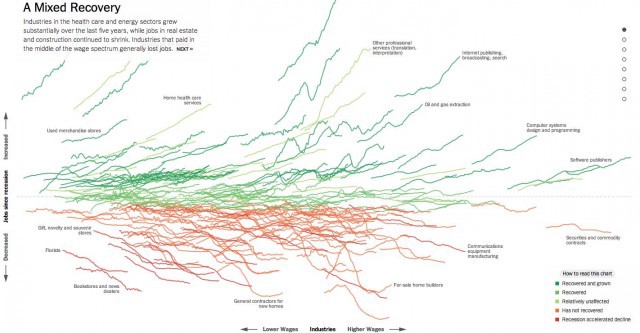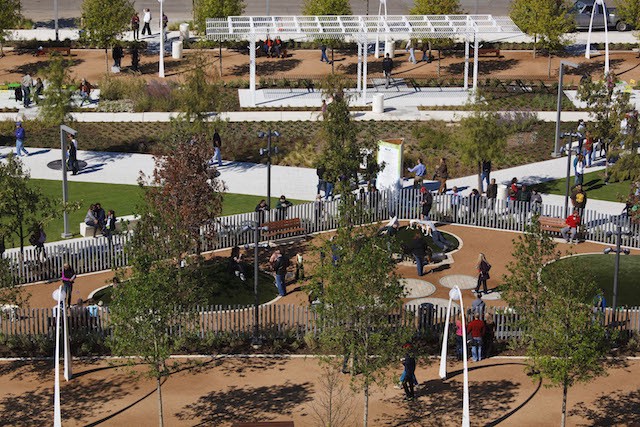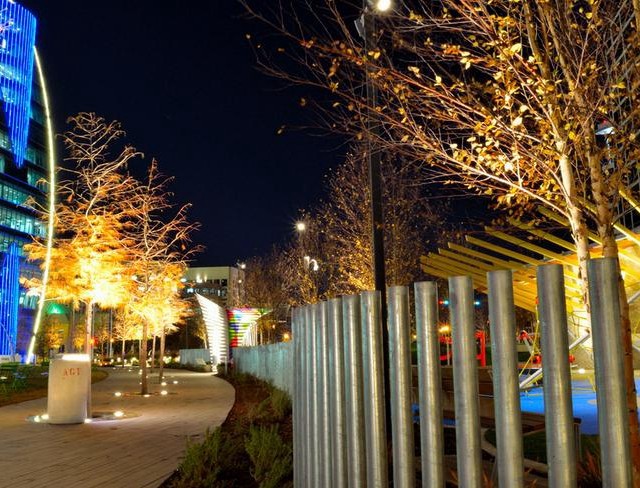A Glass Half-Full of Billions of Dollars
The massive consolidation of telecom companies into a handful of mega-companies is maybe probably a bad thing? I mean, I guess. But things can only get better, because they actually cannot get any worse, since there is basically nothing left for them to glomerate, for now:
Telecommunications bankers are running out of deals to pitch. Over the past three years, a rush of multibillion-dollar acquisitions has reshaped the United States wireless market. Now, with Sprint and T-Mobile zeroing in on an agreement to join forces, one of the last big deals for the industry may be nearing an announcement.
New York City, June 4, 2014

★★ The blue jeans had to be intercepted on their way into the wash; they would have festered in the saturated air had they been hung up to dry. Birds made a racket in the plantings. The sun pressed down. The air conditioning was broken on the nearest 1 train car. Up on the street again, the gaze turned not just down from the overhead glare but inward, toward the buildings, away from the miniature suns reflected in the parked cars. The shade under the trees was correspondingly intense in its shadiness. Then came late afternoon, and all the contrast melted away to gray, so discontinuous with the morning it was as if a whole day had been lost sometime in the middle. An eyelid snapped closed just before a piece of crumpled litter came blowing up the subway steps, scoring a painful direct hit.
The Infographics Have Turned on Us

Nearly everything about The Upshot’s new infographic blockbuster, “How the Recession Reshaped the Economy, in 255 Charts” is grim: Your industry is probably doomed — vocational rehabilitation services, a seemingly highly relevant field in this post-recession, godforsaken labor market, has not recovered — unless you make apps, or wrench natural resources out of our deteriorating planet in order to power the computers on which the apps are made, or you sell truffle-laced chocolate bars to the people making the apps, or brown liquor to the people who aren’t making the apps and trying to get by, perhaps a construction worker or a print journalist or a factory worker. There are two hundred and fifty-five fully interactive charts to tell you this, to overwhelm you with these facts. You could look at one of these charts a day for the next six months and you would still not comprehend the full sweep of its gloom. In fact, if you aren’t in a field where you can afford a computer built in the last six months, you probably can’t even read this beautiful compendium of dire labor prophecies, because it’s so packed with code and graphics and animation by the highly employable data visualization wizards at the Times that your machine can’t even handle it. And if your computer can’t handle it, can you?
A Mayor, Unworthy
Bill de Blasio, weakling:
New friends will learn a secret that old friends like Mr. Hernandez have long known: The most powerful elected official in New York City wouldn’t wow anyone with his feats of strength. He bikes at a middling speed, does not overdo it on the weight machines and barely seems to break a sweat, judging from a couple of recent routines. But he says showing up at the gym is an antidote for the exhaustion that comes with his job.
Perhaps the the mayor, if he wants to garner the respect of his constituents, should consider the finer points of super squatting.
Facebook Explains Itself
That strange sensation, which manifests itself, physically, as the sensation of a pit in your stomach expanding ever wider while the tiniest perceptible dew drops of ice cold sweat force themselves from the pores of your back like an insect emerging from its pupa, is the feeling of sublime dread and utter acceptance that washes over you when you realize that you are about to be completely and utterly consumed, from the inside out. That is what Facebook feels like, to basically everyone, but most acutely to those in the publishing industry. Today it has finally explained why. We have curated the relevant bits above, reproduced in Facebook’s native dialect.
Also:
Organic content still has value on Facebook, and Pages that publish great content — content that teaches people something, entertains them, makes them think, or in some other way adds value to their lives — can still reach people in News Feed. However,
However. However!
A Poem by Sophia Dahlin
by Mark Bibbins, Editor
When Relinquish on a Star
Of June singing, of Monday singing, of losing you by the wayside singing
I never noticed losing you Monday in June, tra la
Of March singing, of relics singing
of bringing it home the first time singing
I invited you home to worry my mother, tra la
Sweet treats in the crisper, lo mein on the counter for hours
biscuits I punched out of dough for the house to devour
Of Rebecca singing, of the concert singing
of losing you at the concert singing
Intermixing too rapidly for my sexual attention span tra la
of quickness singing, of sinning singing, of a longlost girl Friday I’m singing
My right hand disguising whatever my left hand was holding
I stay awake past the cusp of day, sing my not sleeping
You wore me out, leading me not quite from the crime
Did I pee on the leafpile you leapt in
Of sexual exhaustion singing, of the floor tiles, of June
did I get in the boat of your partner
of karaoke, I lobbed my wet eyes at your partner
I told you I meant all my mixing
Of learning I’m toxic to you by your sudden reaction
burial of my flirt and the upturned earth of my bedsheets
burial of my wish the upturned earth of my bedsheets, of not sleeping
singing, of not ending to dream, waking up in June or October
escaping acquaintance by desperate means is a pleasure
but losing your day by the wayside can harm you at nightfall or dawn
snags your eyelids midcycle, I’m learning, singing
glittery boat drip, of a thunderstorm rising past fenceposts I’m singing
of rising from roads into pitch sky and sticking, of packing
of August and skipping to demons sing lo
sorry ’bout the demons tra la
Sophia Dahlin’s poems have recently been in BOMB, Denver Quarterly, and Colorado Review. With Davy Knittle, she runs the Human Body Series in Iowa City.
You will find more poems here. You may contact the editor at poems@theawl.com.
The Soul of America's Urban Park Machine
by Mike Nagel

For a while I was spending every afternoon in Klyde Warren Park. I went there for the same reason everybody went there. I went there to be happy. Why else would you go to the park? I walked over on my lunch break, down St. Paul Street, past the gaudy Baptist church, past the Pearl Cup coffee shop, past the Dallas Museum of Art. I sat in the uncomfortable green metal chairs and I read books. Did I spend time at Klyde Warren Park or in Klyde Warren Park? Prepositions in this case make a difference.
I spent an afternoon with the old man who hands out the board games. I didn’t ask him what his name was but he looked like a Walter. He was wearing a beige, brandless baseball cap and a blue Klyde Warren polo shirt. I asked him which games were the most popular and he said Checkers then Chess then Scrabble, which I probably could have guessed. We were sitting on the green metal chairs next to his rolling cart and not a single person came by all day. Walter just sat there looking out at the grass, and past the grass, the skyscrapers. I thought I was probably bothering him. It was cold and cloudy and the park was practically empty.
Why was this game rental cart even here?
I asked Walter if he liked his job and he said he liked his job fine. I asked him how he’d gotten his job and he said, I applied for it. And the more I thought about this cart the more I wondered if its function was more to be here than to be used, if it was more important for people to have the option to play games than it was for them to play games. People just like knowing it’s here.
“Choice should be built into the basic design,” William Whyte wrote in The Social Life of Small Urban Spaces, a thin little book about plaza usage in Manhattan. The game cart was here for people to say no to.
Before I left, a manager came by with a clipboard and asked Walter which games people were using, which games people weren’t using, which games were missing pieces. She said, It’s almost summer and we’ve got a serious checkers shortage on our hands.
The more time I spent in Klyde Warren the more I saw the park as a meticulously maintained machine. There were workers everywhere all the time, half a dozen at least, if not a lot more. I watched one man on his knees digging mud out of a drain with his bare hands. He didn’t get a drop of it on his bright white uniform. Workers picked empty wrappers out of people’s hands before they could even set them down. I never once saw a piece of litter in Klyde Warren Park. And so while I wanted to believe I was here for the nature, that it was the nature that was making me happy, there really wasn’t anything natural about this place. It was as artificial and constructed as anything else in the city, if not more so. On various days, different sections of grass were roped off to encourage even wearing.
And yet I did feel happy here. Everyone felt happy here. They changed the moment they walked in. Their faces brightened up. I watched one man in what must have been a thousand dollar suit pick his daughter up out of her stroller and twirl her around in the air. He had a pocket square in his breast pocket and his hair was combed and shining. Something about the park reminded people to be happy. Maybe what reminded people to be happy was that other people were happy here too.
“What attracts people most,” Whyte observed, “is other people.”
Well of course there was also the food. Just before lunch five food trucks would pull up next to the curb and people would start getting in line. There was Gandolfonos Sandwiches, Abe’s Flava Flave, Nammi Bahn Mi, What’s the Scoop?, and a truck that sold nothing but sushi and snow cones. Sometimes the lines got so long it took half an hour to get your food. There were better, cheaper, faster restaurants all over the city but this was where people came. This was where people came because this was where people come. “How’s business?” I asked the guy taking my order at Abe’s Flava Flave. I wondered if he was Abe. “Man,” he said, “We can’t even keep up. We’re hiring.” He pointed to a sign taped to the window that said, “We’re hiring.” He handed me my gyro and I ate it by the fountains.
One day the children’s park was closed for repairs and the children stood outside the fence watching the repairmen work.

I came to the park on a Tuesday night after work. It was calmer now but still not empty. In the middle of the grass, a tall guy in biker shorts was leading an “insane workout.” Twenty people were mirroring his every move back to him. It must have been 64 degrees out here, the perfect temperature. The clouds were thin, transparent streaks and they were turning electric orange. The sun was going down. Klyde Warren was built over Woodall Rodgers freeway and cars were turning on their headlights. They disappeared under the park and reappeared on the other side. The movement of the cars made the park seem still by contrast. Watching the traffic was like watching a river, almost no different. I got a text from my friend Josh. He said, “I can see you.” He and Kyle were in the glass pub across the park. “Come have a beer with us,” he said. It was dark when I left the pub, two beers later, and the park was lit up with halogen lights. It was almost empty but not quite. I wondered if it was ever empty. I liked to think not.
The park was always different but always the same. There were always children but never the same children. Always business people but never the same business people. The food trucks rotated daily and I never learned their schedule. Luck of the draw. Sometimes I came with friends but mostly I came alone. I sat near the rolling bookshelves and put my feet up on the chair across from me. I never met anyone new. I waved at Walter and he lifted his fingers off his rolling cart. Whyte: “Plazas are not ideal places for striking up acquaintances, and even on the most sociable of them there is not much mingling… the nearest thing to an exchange is what Erving Goffman has called ‘civil disregard.’”
Even still, I felt connected to this park, and through this park, this city. It doesn’t take much. I came here every afternoon for two weeks. I walked the same route here and back, up and down St. Paul Street, until it became as familiar as anything else in my life. I felt like I was getting to know the park. Maybe I was becoming part of it. Downtown Dallas is not a very inviting place (coffee shops close at 6pm) but in the park I felt welcome.
What are the most popular games? I asked the old man at the game cart. There was a different old man working the cart today. His eyebrows reached up to his bangs. He had friendly looking eyes. He said, Oh, Chess or Checkers probably. Maybe Scrabble.
I’m not sure why I was so interested in which games people played but every time I saw someone new at the game cart I asked them the same question. Maybe I was hoping to learn something surprising, a telling fact that would explain something (everything?) about the people in this park. But the only thing I could learn was that they liked the same three games as everyone else in the world, which was maybe more significant than it seems. Dallas is a stereotype — a caricature. People think we’re a backwards city full of cowboys and oilmen, which is a little bit true but not entirely true. One afternoon in the park a reporter from NPR asked me what I thought about the city. She was doing a story about how the rest of the country sees Dallas. How does the rest of the country see Dallas? I asked her. They think Dallas is nothing but hicks and televangelists, she said.

The weather was getting warmer. It was almost May. The sushi/snow cone food truck was getting a lot of business. When I walked through the park I saw red and blue snow cones everywhere I looked. They caught the sun and glowed like cups full of neon. The children’s park was fixed and kids were running through the fountains. They were running through the fountains screaming as loud as they could. The park was getting busier, packed. There’s a tipping point where Whyte’s theory about people attracting more people no longer applies and that tipping point comes when there is no longer anywhere to sit. I went to the park less and less. I went to coffee shops instead, or to the underground tunnels. I drank cappuccinos. Sometimes I walked to the park and back but didn’t go in. I got to the curb and turned around. Then I stopped going to the park at all. I lost the desire. It seemed further and further away. I liked having the option of going to the park more than I liked going to the park. It was there for me to say no to.
Which games are the most popular? I asked the kid working the game cart. There was a kid working the game cart today. This was one of my last afternoons in the park. It was 80 degrees and getting hotter. I’d been in the sun for hours. The grass looked fake green. The kid looked 18 years old. This must have been his summer job. Chess, he said. Maybe checkers. What about Scrabble? I said. Oh yeah, he said, Scrabble. And I nodded and knocked my knuckles against the cart like I was asking for good luck.
Do you want to rent one? The kid asked.
Of course not, I said and we both shrugged at exactly the same time.
Mike Nagel is a writer in Dallas.
Images from Klyde Warren Park and Brett Chisum.
Where the Wild Leeks Are
Ramps! So tasty! Mostly! (I like them well enough, anyway.) Where do they come from? The self-described ramp capital of the world is in West Virginia:
I knew the ramp farm was somewhere in Richwood and the day after I called, I drove to the town. Richwood, population 2,039, is home to the longest, continuously running festival celebrating America’s native wild leek. (It started in 1921 and while one festival in Crosby, Tennessee, as I seem to remember reading, predates the one in Richwood, it wasn’t held this year. Perhaps there were others, at Legion Halls or churches, but Richwood’s claim seems to hold.) In Brooklyn or Baton Rouge, ramps might fetch up to $20 a pound; here, I was told, you could get a mess of ramps, bacon, beans, biscuits for less than that.
Mmm, ramp festivals.
"Porn Star" Colby Keller Gives Away His Instagram; Fans Concerned, Amused, Deflated
Tomorrow marks the end of #piecesof8 and my final disposal of worldly possessions here in Liberty, Tennessee!
— Colby Keller (@colbykeller) May 31, 2014
One thing he’s given away is his Instagram account. Overnight, suddenly, the account became the property of his friend Dena. Reaction was mixed! Mad, amused, intrigued, welcoming, rude.
What is going on? Who knows!
Seinabo Sey, "Hard Time"
There’s no central database for this, no Just One Chart, but at some point the majority of new music worth listening to will have been written by people born in the 1990s. It’s possible that this moment is imminent. It’s possible that this moment passed some time ago, and nobody had the heart to say anything. In any case: Here is a gorgeous new video from Swedish singer Seinabo Sey (est. 1990).
